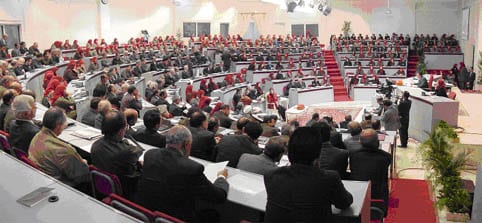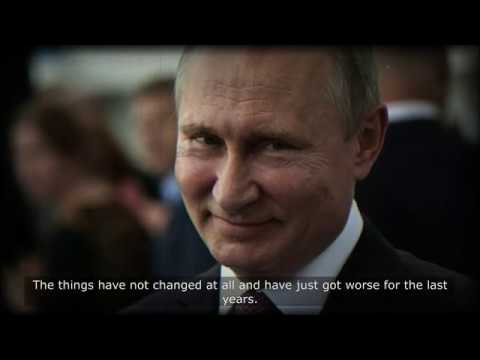
National Council of Resistance of Iran, a broad coalition of democratic Iranian organizations, groups, and personalities, was founded in 1981 in Tehran, Iran on the initiative of Massoud Rajavi, the leader of the Iranian Resistance.
PARLIAMENT IN EXILE
The NCRI is an inclusive and pluralistic parliament-in-exile that has more than 500 members, including representatives of ethnic and religious minorities such as the Kurds, Baluchis, Armenians, Jews and Zoroastrians, representing a broad spectrum of political tendencies in Iran. The NCRI aims to establish a secular democratic republic in Iran, based on the separation of religion and state. Women comprise 50 percent of the Council’s members. There are five organizations represented in the NCRI, including the People’s Mojahedin Organization of Iran (PMOI/MEK), the largest and most popular resistance group in Iran.
DEMOCRATIC DECISION-MAKING
All members of the Council have one vote. All decisions are adopted by a simple majority.
SIX-MONTH PROVISIONAL GOVERNMENT
The Council’s 25 committees form the basis for a provisional coalition government once the mullahs are toppled. Chairing each committee is a prominent political personality who is an expert in the field. The provisional government will be in power for only six months and its main responsibility is to hold free and fair elections for a National Legislative and Constituent Assembly and to transfer power to the representatives of the people of Iran.
PRESIDENT-ELECT
Maryam Rajavi is the President-elect of the NCRI for the transitional period. Her mandate is to oversee the peaceful transfer of power to the Iranian people following the regime’s overthrow.
NATIONAL SOLIDARITY FRONT
In November 2002, the NCRI adopted a plan to form the National Solidarity Front to overthrow the religious dictatorship ruling Iran. The front will encompass all Iranians who are campaigning for regime change and establishment of a secular republic. Mrs. Rajavi, described the Front as “a reflection of the most profound democratic yearnings of all the people of Iran, regardless of ideology, belief, religion and ethnicity that transcends all partisan and political interests.” She said the Front “embodies the unshakable resolve of the Iranian people to overthrow the mullahs’ inhuman regime.”
Platform:
HUMAN RIGHTS
The NCRI is committed to abolish the death penalty and adheres to the Universal Declaration of Human Rights and relevant covenants, including freedom of association, freedom of thought and expression, media, political parties, trade unions, Councils, religions and denominations, freedom of profession, and prevention of any violation of individual and social rights and freedoms.
WOMEN
The NCRI recognizes “the right of women to elect and be elected in all elections, and the right to suffrage in all referendums,” “the right to employment and free selection of profession, and the right to hold any public, office or profession including the presidency or judgeship,” “the right to freely choose clothing and covering,” and “the right to use, without discrimination, all instructional, educational, athletic, and artistic resources; the right to participate in all athletic competitions and artistic activities.”
ECONOMY
The Council accepts national capitalism and the market economy, private ownership and investment. It emphasizes the need to utilize the latest scientific and technological achievements and views relations with the industrialized world as necessary to reconstruct Iran’s economy.
FREEDOM OF RELIGION
The NCRI believes in the separation of religion and state. According to its ratifications, “all forms of discrimination against the followers of various religions and denominations in the enjoyment of their individual and social rights are prohibited. No citizen shall enjoy any privileges or be subject to any deprivations with respect to nomination for election, suffrage, employment, education, becoming a judge or any other individual or social rights, for reason of belief or non-belief in particular religion or denomination.”
NATIONAL MINORITIES
The NCRI recognizes the rights of all ethnic and national minorities. It has adopted a plan for the autonomy of Iranian Kurdistan, specifying that “the administration of all affairs of the autonomous region of Kurdistan,” except for those related to foreign policy, national defense, national security, foreign trade and customs, “fall within the authority of the autonomous institutions.”
INTERNATIONAL RELATIONS
The Council’s foreign policy is based on independence, respect for the United Nations Charter and international conventions and treaties, good neighborliness, international and regional cooperation and non-interference in the internal affairs of other countries. The NCRI supports the Middle East peace process and is committed to maintaining and protecting peace and tranquility in the region and condemns any aggression and expansionism. The Council opposes nuclear proliferation and the production of weapons of mass destruction and ballistic missiles.



. The regime continues to suppress this information and routinely under-reports the actual number of executions. Amnesty International has noted that while the regime officially claims that only 246 executions have taken place in 2015, this number is closer to 700 in reality.
. The regime continues to suppress this information and routinely under-reports the actual number of executions. Amnesty International has noted that while the regime officially claims that only 246 executions have taken place in 2015, this number is closer to 700 in reality.